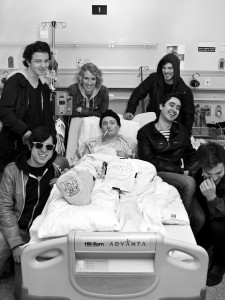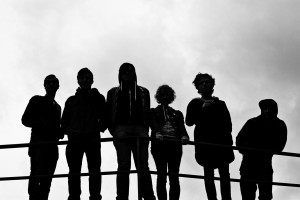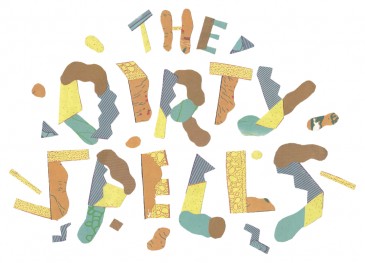“Make more laser sounds!” I’m sitting in a swivel-chair at Watershed Productions, a recording studio overlooking Victory Square. An hour earlier, I met Greg Pothier and Doug Phillips, the two figureheads behind Dirty Spells, and instead of asking me where I wanted to interview them, the first question they pitched was how much time I had to work with.
Before long, I found myself on the other side of a soundproof booth listening to a violin mimic blaster rifles. Dirty Spells are anything but orthodox. Along with Emily Bach, Bryce MacLean, Graeme and Ryan Betts, and Eric Campbell, the recording studio was bursting at the seams.
“We asked, ‘what if we put two bands together?’” Pothier tells me later over a plate of nachos at Foundation. Boasting both dueling drums and guitars, bass, violin and sax, it’s easy to get caught up in all the sounds going on in Dirty Spells’ first EP, released at the end March.
The band, which shares members with the likes of the New Values and Sigourney Beaver, are “building a wall of noise, and each instrument is a brick,” says Pothier, but it would be a mistake to dismiss the psych-rock collective as cacophonic. “We don’t want to sound like seven different people playing apart,” Phillips notes, “We’re taking these jazz and classical instruments and totally misusing them, trying to find a way to incorporate them without standing out.”
Back in the studio, producer Hayz Fisher, also of the New Values, gives me the abbreviated tour of the recording equipment and gear. There’s the usual assortment of pristine soundboards and antique effects racks, but what makes this space so easy to relax in is the sense of history: every guitar, every book, every framed picture or propped-up card has a story behind it. There’s no beer-stains here, but you can tell just by the chips of paint on the ledge of the sound-booth, and the worn patches on the hardwood floor that this place has seen many a pilgrim. It’s been a long two days for the musicians and their producer, but the warm environment doesn’t feel like a prison one bit.
On this, the final day recording, I arrive just in time to watch Bach lay down her parts on violin, which were more space-rock than chamber music. “I’ve [been] playing classical music since I was three: really stodgy, up-tight [and] structured. It’s great to play in a band where I just get to make noises instead of reading sheet music. I feel like it’s an evolution… or a devolution?” Bach’s contributions to the psychedelic “UFO” (written with an eye to Pothier’s childhood growing up near the Franconia Notch, an infamous alien hotspot) are bold slabs of paint on an already-colourful canvas; watching her experiment on her violin to etch out the right frequencies is a bit like how I expect Foley artists operate, albeit with fewer observers.
Everyone on my side of the glass was either gesticulating wildly, making laser sounds with their mouths, or enthusiastically nodding their heads when the perfect pitch was attained. The result needs to be heard to be believed, lying somewhere between Jimmy Page’s more druggy Zeppelin moments and a guy-wire being snapped in slow-motion.
Graeme Betts’ performance was equally mesmerizing, as he contributed saxophone tracks with a notable twist: he was feeding his sax through a whammy pedal, which he used like a trucker on speed, changing the pitch of his instrument with freakish irregularity. The end result was a psychotic blend of bluesy horn hits and what MacLane called “demon-brass,” like the sound of a steam-engine train in a tunnel thrown through a blender. “I feel pretty good about jamming in a psychedelic band,” Betts says, “[I] kinda get my growl on”. Or, as Phillips aptly puts, “It’s a saxophone, but it sounds like a synthesizer.” The group had recorded guitar, bass and drums the previous day, and most of the vocal work was done early in the studio, before I arrived. They assured me that I wasn’t missing much though, noting how tedious it was to get all of those instruments just right.

As time in the studio dwindles to an end, everyone sets up to shout out gang vocals for the track, “Hangover City”. This event had been mentioned often throughout the course of the day as sort of a milestone moment, both for signifying the end of the long day and as something genuinely fun and relatively easy that the group can relax on. The song itself is a pretty straight-forward rock tune to the sound of late-’60s Rolling Stones, and is one of the only pieces on the four-track EP that I could discern a notable influence.
The lines we were shouting, “Hangover City!” and “That girl was pretty!” were just silly enough out-of-context to make giggling between takes nearly impossible to avoid. The track, less psych than Americana, has a distinct “Johnny B. Goode” feel with its walking bass line and thick guitar chords. And unlike what the name suggests, the track is filled with the kind of songs-for-summer optimism that predates a morning-after headache.
“Hangover City” also ties in to the band’s methods for getting their music heard. “The EP is entirely to put together a Sonicbids page to be able to apply for [music festivals such as] Music Waste, Olio, Rifflandia, [and] Sled Island”, Pothier explains. “We’re going to be printing postcards with the Bandcamp link and ‘Greetings From Hangover City’ on them. Postcards are cool, right?” The catch-phrase, which started as a joke between Ryan Betts and the rest of the band, seems to fit the lunatic positive energy that possesses the entire group.
“The only thing that sucks about this band is the parking tickets” bemoans MacLean as we exit Watershed to a fresh batch of paper slips on their vehicles.
It’s likely that in the future, Dirty Spells will have an elaborate and impossible-to-verify backstory regarding the formation of their band, possibly with oblique references to the supposed alien abductions of Betty and Barney Hill, that inspired Pothier to write “UFO.” Maybe they’ll claim that the seven of them came together during a witch-hunt or while searching for the elusive Ogopogo, but the reality is a lot simpler.

“Doug and I were in a short-lived band [called] Shot Royalties,” recalls Pothier. “I had a bunch of gigs that I [was committed to playing]; I didn’t want to play solo so I asked my friends if they wanted to join up, and it worked great… [but] it’s still in its embryonic form.”
So how likely is it that the incarnation of Dirty Spells I talked to will be the same that is playing shows a few months from now? According to Phillips, it’s hard to say. “It’s an old idea that Greg and I had, to have a rotating cast of people coming in and contributing on certain songs. It built from there, even if our setup is more permanent now.”
Over the sounds of us digging into nachos and beer, there’s the noise of a band in flux. With an EP out the door and the prospect of festival spots in the headlights, Dirty Spells has all the positive energy it needs to do something remarkable. Spending a few hours talking about music, art and space aliens, I realized that their passion and warmth is contagious. If their live sets are anywhere near as friendly and interesting, Dirty Spells will have a lot of fun in Vancouver, even if it is Hangover City.


